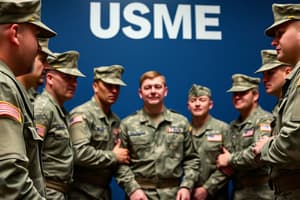Podcast
Questions and Answers
Match the following terms related to military leadership with their definitions:
Match the following terms related to military leadership with their definitions:
MILITARY = The armed forces responsible for securing and defending the country LEADERSHIP = The ability to influence and guide followers COMMAND = The authority exercised over subordinates by rank LEADER = A person who inspires and influences to accomplish a mission
Match the characteristics of a boss with those of a leader:
Match the characteristics of a boss with those of a leader:
Boss = Says 'I' Leader = Says 'Let's go'
Match the responsibilities of a leader with their descriptions:
Match the responsibilities of a leader with their descriptions:
Accomplishment of the mission = The primary goal of military leadership Welfare of subordinates = Looking out for the needs of service members Training as a team = Preparing soldiers to work effectively together Leadership during battle = Guiding units in combat scenarios
Match the roles of a leader to their functions:
Match the roles of a leader to their functions:
Match the eleven principles of a leader with their key actions:
Match the eleven principles of a leader with their key actions:
Match the following types of leadership with their descriptions:
Match the following types of leadership with their descriptions:
Match the following factors of leadership with their definitions:
Match the following factors of leadership with their definitions:
Match the leadership traits with their descriptions:
Match the leadership traits with their descriptions:
Match the following leadership traits with their characteristics:
Match the following leadership traits with their characteristics:
Match the essential qualities of a leader with their descriptions:
Match the essential qualities of a leader with their descriptions:
Match the following leadership actions with their purposes:
Match the following leadership actions with their purposes:
Match the types of leadership styles with their leadership approach:
Match the types of leadership styles with their leadership approach:
Match the following phrases with the corresponding leadership characteristic:
Match the following phrases with the corresponding leadership characteristic:
Flashcards
Military Leadership
Military Leadership
Influencing people to achieve military objectives through purpose, direction, and motivation.
Leader vs. Boss
Leader vs. Boss
A Leader inspires and collaborates, while a Boss uses authority.
Leader Responsibilities
Leader Responsibilities
Achieving the mission and looking after the well-being of subordinates.
Leader Roles
Leader Roles
Signup and view all the flashcards
Leader Principles (e.g., Know Yourself)
Leader Principles (e.g., Know Yourself)
Signup and view all the flashcards
Authoritative Leadership
Authoritative Leadership
Signup and view all the flashcards
Participative Leadership
Participative Leadership
Signup and view all the flashcards
Delegative Leadership
Delegative Leadership
Signup and view all the flashcards
Follower in Leadership
Follower in Leadership
Signup and view all the flashcards
Leader in Leadership
Leader in Leadership
Signup and view all the flashcards
Communication in Leadership
Communication in Leadership
Signup and view all the flashcards
Situation in Leadership
Situation in Leadership
Signup and view all the flashcards
Know Yourself as a Leader
Know Yourself as a Leader
Signup and view all the flashcards
Study Notes
Military Leadership
- Military is responsible for securing and defending the country
- Leadership is the ability to influence and guide followers
- A leader inspires and influences others to accomplish the mission
- Command is the authority a person exercises over subordinates
- Military leadership involves influencing others to accomplish the mission by providing purpose, direction, and motivation
Boss vs. Leader
- A boss relies on authority, ultimatums, and emphasizes "I" and "my way"
- A leader relies on goodwill, encourages enthusiasm, and uses "we"
- A leader develops people and takes responsibility
Responsibilities of a Leader
- Accomplish the mission
- Look out for the welfare of subordinates
Roles of a Leader
- Model soldier and commander
- Mentor
- Coach
- Counselor
- Custodian of his men's welfare
Principles of a Leader
- Know yourself and seek self-improvement
- Be technically and tactically proficient
- Seek responsibility and take responsibility
- Make timely and sound decisions
- Set a good example
- Know your soldiers and look out for their welfare
- Keep subordinates informed
- Develop a sense of responsibility in subordinates
- Ensure tasks are understood, supervised, and accomplished
- Train soldiers as a team
- Employ command in accordance with its capabilities
Three Basic Leadership Types
- Authoritative
- Participative
- Delegative
Four Factors of Leadership
- Follower
- Leader
- Communication
- Situation
Leadership Framework
- Leaders must be committed to professional ethics
- Leaders must have professional character and traits
- Leaders must know the four factors of leadership and how they affect each other
- Leaders must know themselves
Leadership Qualities
- Human nature
- Response to stress
- Strengths and weaknesses of subordinates
- Knowledge and skills of subordinates
- Provide direction, goal-setting, problem-solving, decision-making, planning, communication, coordination, supervision, and evaluation
14 Leadership Traits
- Bearing (appearance, carriage, deportment)
- Courage (mental quality to face fear/danger)
- Decisiveness (ability to make quick decisions)
- Dependability (certainty of performance)
- Endurance (physical and mental stamina)
- Enthusiasm (sincerity and zeal in duty)
- Initiative (taking action without orders)
- Integrity (moral principles and honesty)
- Judgment (ability to weigh facts and make sound decisions)
- Justice (equitable and consistent treatment)
- Knowledge (job-related and subordinate knowledge)
- Loyalty (faithfulness to country, superiors, subordinates)
- Tact (respectfully dealing with others)
Further Points (Page 2)
- Some people are born leaders, some are developed leaders
- Disappointing leaders have the qualifications but break under pressure
Studying That Suits You
Use AI to generate personalized quizzes and flashcards to suit your learning preferences.




